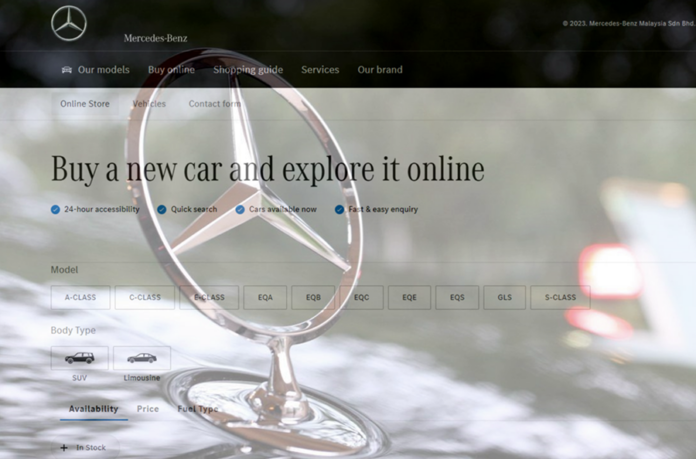As reported in July, the Mercedes-Benz business model in Malaysia has switched to an ‘agency model’, following a trend that is taking place in the industry globally. Although the Malaysian auto industry landscape changed in the late 1990s with the brand owners – the carmakers – coming in and getting directly involved in distribution and marketing activities, dealers remained largely the ones who interacted with customers.

In the new model, the brand owner – the carmaker – takes over greater control of the sale of a new vehicle. The dealers – referred to as ‘Retail Partners’ – will still have a role in the early aspects of a purchase such as providing information and test-drives and being Brand Ambassadors.
They will, however, focus more on post-purchase aspects such as delivering new vehicles and providing aftersales and warranty services.
![Cycle & Carriage Autohaus Ipoh [2022]](https://www.motaauto.com/wp-content/uploads/2023/09/Cycle-Carriage-Autohaus-Ipoh-2022-3.jpg)
Retail of the Future
Having done so, it is now implementing the ‘Retail of the Future’ agency model which it says ‘creates a new way to purchase a new car, providing customers with a fully integrated and holistic buying experience’.
“The agency model is a business operation that puts our customers at the heart of it. It’s designed to match the changing ways our customers shop, while also empowering our Retail Partners with a more streamlined and efficient business approach. This model also helps us work towards giving our customers with the best possible experience,” said Bettina Plangger, Vice-President, Sales & Marketing at Mercedes-Benz Malaysia (MBM).
Buying cars online
The carmakers see an increasing number of car-buyers doing their shopping online, so this would be the starting point although there will still be physical showrooms at dealerships. Of significance is the ‘one price’ approach which means that it will no longer be advantageous to shop around. MBM will determine the retail price and also manage the purchase process.

For dealers, the new model will place more emphasis on their aftersales services, which will call for customer retention. But that’s something they have been doing anyway, investing millions in outlets that offer an experience commensurate with the brand’s status.
![Mercedes-Benz Cycle & Carriage Autohaus Ipoh [2022]](https://www.motaauto.com/wp-content/uploads/2023/09/Cycle-Carriage-Autohaus-Ipoh-2022-1.jpg)
MBM acknowledges that dealers will continue to be important to the business, hence being designated as Brand Ambassadors. They will be available to help customers while they are considering their purchase and provide the necessary support. Ultimately, they would hope to be the customer’s preferred choice to use, thereby extending the relationship.
“The launch of our agency model is an exciting time for us and our retail network. This new approach brings a host of benefits from providing our customers with the luxury of interacting with our brand on their terms, at their convenience. The agency model makes sure that it doesn’t matter if you’re shopping online, visiting a physical store, or doing both; our customers are offered with the best price and the process is smooth and clear,” said Amanda Zhang, CEO & President, Mercedes-Benz Malaysia.
Mercedes-Benz shifts to agency model for business in Malaysia
